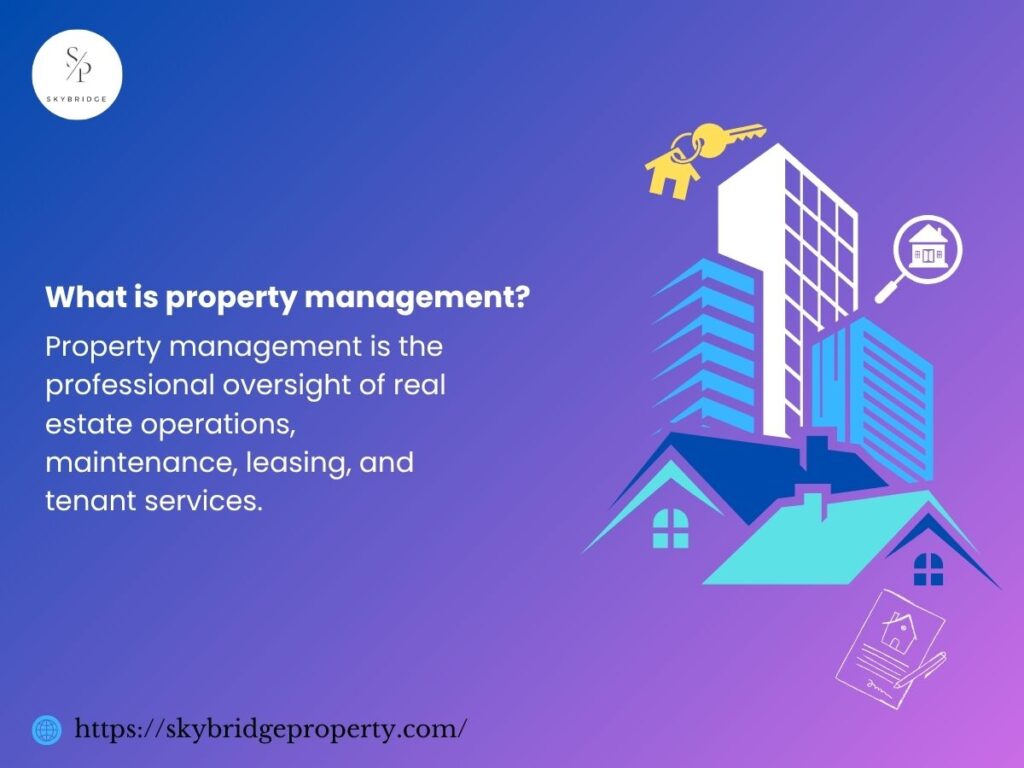Managing real estate involves more than owning property because it requires active oversight of operations, tenants, finances, and legal compliance. Property owners across residential and commercial sectors depend on property management professionals to ensure their assets perform reliably and remain protected over time.
Service delivery can come from either individual property managers handling localized portfolios or larger property management firms managing diverse residential communities and commercial developments. The selection often depends on the property’s size, complexity, and specific operational goals.
Exploring the different types of property management services and the responsibilities and benefits involved helps property owners structure their management strategies for maximum efficiency and long-term investment success. In the following sections, we explore how professional managers support property operations, tenant satisfaction, and long-term asset value.
What is Property Management?
Property management is the professional oversight of real estate operations, maintenance, leasing, and tenant services. Through structured and proactive administration, this oversight ensures that real estate assets maintain operational efficiency, retain financial value, and comply with all relevant landlord-tenant laws and legal compliance.
Within this framework, a property manager plays a central role by executing day-to-day functions that support the owner’s investment objectives and safeguard tenant satisfaction. Property managers may operate individually, offering localized services, or within a property management company that manages diverse residential, commercial, and industrial real estate portfolios using broader resources and standardized systems.
According to Fortune Business Insights, the U.S. property management market, valued at USD 3.40 billion in 2020, is projected to reach USD 6.16 billion by 2028, representing a 7.9% compound annual growth rate (CAGR). This significant growth signals a rising dependence on professional property administration to optimize property returns and ensure regulatory compliance across asset classes.
What is the Importance of Property Management in Real Estate?
Property management plays a direct role in protecting real estate investments and ensuring smooth day-to-day operations. A well-managed property not only retains its value but also provides stability for both owners and tenants.
Some of the key reasons property management is important include:
- Maximizing Property Value – Regular maintenance, upgrades, and proactive care help preserve and even increase long-term value.
- Reliable Tenant Management – Screening tenants, handling leases, and addressing concerns promptly helps maintain steady occupancy.
- Consistent Cash Flow – Timely rent collection and efficient financial tracking ensure steady income for property owners.
- Legal Compliance – Professional managers assist owners in meeting housing regulations, safety standards, and landlord-tenant laws.
- Reduced Vacancy Rates – Strategic marketing and tenant retention efforts minimize downtime between leases.
- Stress-Free Ownership – With a management team handling the details, property owners can focus on growth instead of daily issues.
How Well Do You Understand Property Management?
1. What is the core role of a property manager?
(A) Selling property to tenants
(B) Overseeing operations, leasing, and compliance ✅
(C) Inspecting municipal buildings
2. Which of the following is NOT a typical responsibility?
(A) Rent collection
(B) Landscaping and snow removal
(C) Tenant surgery scheduling ✅
3. Why is property management growing in the U.S.?
(A) Increase in public housing
(B) Owner demand for higher returns and compliance ✅
(C) New zoning laws only
Answer Key – Check Your Understanding
- Q1: (B) Overseeing operations, leasing, and compliance
- Q2: (C) Tenant surgery scheduling
- Q3: (B) Owner demand for higher returns and compliance
Property Management Firms vs Individual Managers
Property management firms are structured organizations that manage multiple real estate properties with extensive resources and standardized processes, while individual managers operate independently, offering more personalized but narrower service scopes.
| Aspect | Property Management Firm | Individual Property Manager |
| Scale of Operations | Manages multiple properties and portfolios | Focuses on a smaller number of units |
| Service Scope | Full-service, including leasing, maintenance, and legal compliance | Limited, often basic, tenant and rent management |
| Technology Access | Uses real estate management platforms and automated systems | Relies on manual processes or limited tech tools |
| Staff Resources | Employs in-house maintenance, legal, and accounting teams | Performs tasks personally or outsources selectively |
| Licensing and Certification | Typically holds corporate licenses, CPM, or ARM certifications | May possess basic licensing or work under a broker |
| Customization and Flexibility | Offers standardized service packages with customized options | Offers highly personalized service based on the owner’s preference |
Types of Property Management Services
Different types of property management services are structured around the specific operational needs of residential properties, commercial spaces, industrial facilities, and special-purpose assets. Each service type requires tailored management approaches that align with the nature of the asset, tenant expectations, and legal requirements.
By understanding the distinctions among these types of property management, property owners and investors can ensure their real estate assets are professionally administered for maximum efficiency, compliance, and financial performance.
Residential Properties
Managing residential properties involves maintaining rental homes, apartments, and condominiums with a strong emphasis on tenant experience and responsive operational handling. Property managers in this category prioritize swift tenant communications, lease cycle management, and property upkeep to preserve asset value.
Shorter lease durations, typically ranging from six to twelve months, require proactive vacancy management and dynamic marketing strategies. For example, apartment managers often initiate renewal campaigns 90 days before lease expiration to reduce turnover and maintain high occupancy rates.
Commercial Properties
Administration of commercial properties focuses on operating office towers, retail centers, and mixed-use buildings where business performance drives tenancy stability. Managers are responsible for negotiating favorable lease terms, allocating utility costs fairly, and maintaining high occupancy ratios to maximize landlord returns.
Due to longer leasing periods, often three years or more, compliance with zoning laws, building codes, and accessibility standards becomes a constant operational duty. For instance, commercial property managers routinely coordinate tenant improvement projects to adapt spaces for evolving business needs without disrupting regulatory compliance.
Industrial Segments
Operating within industrial segments demands strict infrastructure oversight tailored to warehouses, logistics hubs, and manufacturing plants. Property managers must supervise building maintenance, machinery accommodations, and spatial logistics while fully adhering to industrial zoning regulations.
Lease agreements in industrial properties frequently extend beyond a decade, requiring consistent coordination of major repairs and facility upgrades. Managers must anticipate infrastructure wear patterns and schedule preventive maintenance to protect tenant operations and ownership value.
Specialized-Purpose Property Management
Handling special-purpose properties requires specialized knowledge of niche real estate, such as student housing, senior living facilities, and resorts. Managers orchestrate a blend of property maintenance, staffing logistics, and regulatory compliance adapted to each asset’s unique operational profile.
Unlike traditional property categories, special-purpose assets often involve high regulatory oversight. For example, a student housing manager must balance semester-driven leasing cycles, coordinate safety inspections, and ensure that communal spaces meet legal occupancy standards year-round.
Quick Comparison of Types of Property Management Services
| Property Type | Primary Focus | Lease Cycle Length | Compliance Complexity | Maintenance Priority |
| Residential Properties | Tenant experience and occupancy | 6–12 months | Moderate (housing codes, fair housing) | High (apartment repairs, home upkeep) |
| Commercial Properties | Business tenancy and profitability | 3–10 years | High (zoning, accessibility, licensing) | Moderate (building systems, utility management) |
| Industrial Properties | Facility functionality and logistics | 3-10+ years | High (industrial zoning, environmental laws) | Critical (machinery support, loading docks) |
| Special-Purpose Properties | Specialized regulatory compliance | Seasonal/Annual | Very High (health, safety, ADA standards) | High (niche-specific infrastructure) |
What Do Property Management Companies Do?
Property management companies oversee real estate operations, tenant services, financial reporting, and legal compliance. Their structured daily oversight and long-term strategic planning enable property owners to maximize asset value while ensuring regulatory compliance and tenant satisfaction.
The tasks addressed under what a property management company does include tenant screening, rent collection, lease administration, budgeting and financial reporting, eviction handling, owner-tenant communication, and regulatory adherence. Each function is critical to ensuring the seamless operation of residential, commercial, industrial, and special-purpose properties.
Table highlighting Key Functions of Property Management Companies
| Function | Primary Activity | Core Benefit to Property Owners |
| Tenant Screening | Verifying credit, employment, and rental history | Reduces delinquency and improves tenant reliability |
| Rent Collection | Managing manual, online, and automated payments | Ensures consistent and timely cash flow |
| Lease Administration | Drafting, negotiating, and renewing leases | Protects legal interests and reduces lease disputes |
| Budgeting and Financial Reporting | Creating budgets, tracking KPIs, and forecasting expenses | Provides transparency and supports investment decisions |
| Eviction and Legal Compliance | Issuing notices, filing legal actions | Minimizes legal risks and speeds up vacancy recovery |
| Communication with Owners and Tenants | Maintaining updates, resolving issues | Enhances transparency and strengthens tenant relations |
| Understanding Local Regulations | Adapting to legal updates in zoning and housing laws | Avoids penalties and ensures regulatory compliance |
- Tenant Screening
Evaluating potential tenants is a critical task that property managers perform to protect rental investments. Screening typically involves verifying credit scores, confirming employment stability, and reviewing rental histories to assess tenant risk.
By admitting applicants with strong financial backgrounds, property managers reduce the likelihood of rent delinquency and costly evictions. For instance, selecting tenants with consistent income and clean rental records lowers turnover costs significantly.
- Rent Collection
Managing rent collection systems helps property owners maintain steady and predictable income. Property managers streamline the process using manual payments, online portals, and automated transfers tailored to tenant preferences.
Integrating rent collection with financial tracking tools improves transparency and enforcement. For example, systems that automate payment reminders have been shown to increase on-time rent payments by 30-40%.
- Lease Administration
Handling lease agreement forms is the foundation of property management operations. Managers draft contracts, negotiate fair terms, coordinate renewals, and ensure tenants uphold lease obligations throughout occupancy.
By overseeing move-in inspections, deposit management, and lease enforcement, property managers create clearer expectations. Well-defined maintenance clauses at lease signing often reduce disputes at the end of tenancy.
- Budgeting and Financial Reporting
Supervising financial operations allows managers to control property cash flows effectively. Creating annual budgets, forecasting repair expenses, and managing reserve funds are critical to long-term asset stability.
Detailed monthly statements help owners efficiently track income, expenses, and capital reserves. Incorporating key financial indicators, like net operating income (NOI), into reports enhances investment decision-making.
- Eviction and Legal Compliance
Processing evictions lawfully protects owners from legal liabilities. Property managers follow step-by-step procedures, from issuing cure notices to filing court documents and ensuring compliance with local landlord-tenant laws.
Maintaining complete documentation throughout the eviction builds a defensible case if legal challenges arise. Proper notice service, such as a standard three-day notice (Notice to Pay Rent or Quit), is often the critical starting point for successful evictions.
- Communication with Owners and Tenants
Maintaining clear communication strengthens operational transparency and tenant satisfaction. Property managers deliver routine updates through emails, tenant portals, and scheduled owner reporting.
Fast response times for maintenance requests and mediation of tenant concerns are part of standard service expectations. Many management agreements guarantee responses within 24 to 48 hours for non-urgent issues.
- Understanding Local Regulations
Staying current with regulatory changes is essential for risk management. Property managers monitor zoning laws, fair housing regulations, and municipal codes to ensure property practices remain compliant.
Failing to update lease clauses based on new legal requirements can result in penalties. For instance, compliance with rent control updates or ADA accessibility standards prevents costly fines and tenant disputes.
Who Needs Property Management?
Challenge: Managing scattered tenants, finances, and repairs across locations.
Solution: Centralized management improves occupancy, reporting, and vendor coordination.
Challenge: Cannot monitor or respond to property needs from a remote location.
Solution: Local managers handle inspections, emergency issues, and tenant support on-site.
Challenge: High guest turnover, inconsistent bookings, and negative reviews.
Solution: Full-service managers optimize pricing, cleanings, and guest communications.
Challenge: Wants passive income with no time spent on tenant or legal concerns.
Solution: Management firms handle leasing, compliance, and returns monitoring.
Challenge: Must follow HUD rules, income verification, and rent caps with precision.
Solution: Certified property managers ensure full program compliance and tenant eligibility tracking.
Property owners, landlords, and real estate investors need property management to achieve efficient operations, legal compliance, and stronger financial outcomes. Professional property management services help manage tenant turnover, maintenance tasks, and local regulation complexities across various property types without burdening owners.
- Owners of Multiple Rental Properties
Managing several rental units becomes increasingly complex without professional oversight. Property managers centralize maintenance scheduling, tenant communications, and financial reporting, allowing portfolio landlords to maintain control without operational overload.
- Absentee or Out-of-State Landlords
Distance creates significant challenges in maintaining rental properties and handling emergencies. Property managers provide on-site supervision, conduct inspections, and manage tenant needs directly, ensuring remote-owned properties remain compliant and profitable.
- Vacation Rental Property Owners
Short-term rental properties require specialized management to address high turnover and variable occupancy rates. Property managers handle guest communications, dynamic pricing adjustments, and cleaning coordination to maintain profitability in competitive vacation markets.
- Real Estate Investors Seeking Passive Income
Investors aiming for passive returns avoid operational involvement by delegating to property managers. Services like tenant screening, maintenance supervision, and financial reporting allow investors to increase ROI while minimizing day-to-day risks.
- Affordable Housing Program Participants
Compliance with HUD guidelines and rent control laws makes managing affordable housing highly technical. Property managers oversee tenant eligibility, maintain government reporting standards, and help maximize occupancy while adhering to fair housing regulations.
Property Management Licensing and Regulations
Strict state licensing laws, local housing regulations, and specialized compliance standards govern property management across the United States. Ensuring legal property operations demands adherence to multiple layers of oversight, particularly in states with comprehensive legal frameworks.
For example, California property management laws are governed by the California Department of Real Estate (DRE), which regulates licensing through the Business and Professions Code §10131.01. Under these regulations, any individual who manages property, collects rent, or negotiates leases for compensation must hold a valid real estate broker license. Limited exemptions may apply to certain on-site property managers employed directly by property owners under specific conditions.
In addition to licensing, property managers must comply with operational requirements based on property size. These requirements ensure rapid emergency response, ongoing maintenance oversight, and improved tenant safety, particularly in high-density housing environments.
Municipal governments across the state may impose additional housing standards that reflect local priorities. These can include rent stabilization ordinances, habitability codes, and corrective education mandates. In some jurisdictions, owners of affordable housing properties may be required to submit management plans that demonstrate compliance with fair housing laws and tenant protections.
Professional certifications also play a vital role in setting qualified property managers apart in competitive markets. Organizations such as the Institute of Real Estate Management (IREM) and the National Association of Residential Property Managers (NARPM) offer designations like the Certified Property Manager (CPM) and Residential Management Professional (RMP). These credentials validate proficiency in financial reporting, tenant relations, maintenance supervision, and regulatory compliance.
Property Management Licensing and Compliance Structure in California
| Level | Agency or Code | Requirement or Regulation |
| State Licensing | California Department of Real Estate (DRE) | Must hold a Real Estate Broker License to manage properties |
| State Law Specific | Business and Professions Code §10131.01 | Defines licensing requirements and exemptions for on-site managers |
| Local City Law | Los Angeles Housing Department (LAHD) | Enforces rent control, habitability standards, and tenant protections |
| Corrective Action | LAHD Property Management Training Program (PMTP) | Mandatory education for cited property owners |
| Compliance Plan | LAHD Property Management Plan (PMP) | Required for affordable housing and accessibility compliance |
| Professional Standards | IREM (CPM) and NARPM (RMP) Certifications | Advanced certifications verifying operational and legal expertise |
Benefits of Property Management
The primary benefits of property management include operational efficiency, reduced owner workload, improved tenant experiences, and stronger legal compliance. By delegating daily property operations to professionals, owners can enhance property value, minimize vacancy risks, and reduce exposure to legal liabilities.
Below is a detailed discussion of the 5 key benefits of property management.
- Time Savings for Property Owners
Professional property management saves owner’s significant time by handling daily tenant communications, rent collection, maintenance coordination, and legal compliance tasks. Instead of personally addressing emergencies or lease issues, owners can focus on strategic growth or enjoy passive income benefits.
- Reduced Vacancy and Turnover
Property management companies implement proven marketing strategies, tenant screening, and lease renewal processes that reduce vacancy periods. Managers directly protect rental income stability by maintaining high occupancy rates and minimizing tenant churn.
- Improved Tenant Satisfaction and Retention
Effective property management ensures timely maintenance responses, clear communication channels, and fair conflict resolution. High tenant satisfaction often results in longer lease renewals, reducing costly turnover expenses for property owners.
- Legal Risk Mitigation
Professional property managers stay current with landlord-tenant laws, fair housing regulations, and zoning codes to shield owners from legal exposure. Their proactive handling of compliance reduces the risks of fines, lawsuits, and regulatory disputes.
- Professional Maintenance Handling
Property management teams coordinate preventive maintenance, emergency repairs, and vendor negotiations with professional efficiency. Timely upkeep enhances tenant experience and preserves long-term property asset value.
Summary of Benefits of Property Management
| Benefit | Direct Outcome for Property Owners |
| Time Savings | Focus on strategic activities or passive income growth |
| Reduced Vacancy and Turnover | Higher occupancy rates and more consistent cash flow |
| Improved Tenant Satisfaction | Longer tenant retention and lower turnover costs |
| Legal Risk Mitigation | Minimized lawsuits, fines, and regulatory violations |
| Professional Maintenance Handling | Extended property lifespan and enhanced asset value |
What Are the Potential Challenges of Property Management?
While property management offers many benefits, it also comes with challenges that require time, expertise, and attention to detail. Recognizing these difficulties helps owners and managers prepare effective solutions.
Some common challenges include:
- Tenant Issues – Late payments, lease violations, or disputes can disrupt operations and require careful handling.
- Maintenance Demands – Unexpected repairs, routine upkeep, and vendor coordination can be costly and time-consuming.
- Vacancy and Turnover – Finding reliable tenants quickly while minimizing downtime is an ongoing concern.
- Legal and Regulatory Compliance – Keeping up with landlord-tenant laws, safety codes, and changing regulations can be complex.
- Financial Management – Tracking expenses, managing budgets, and ensuring rent collection requires strong oversight.
- Time Commitment – Balancing multiple properties or tenants often becomes overwhelming without professional support.
How Much Does It Cost to Hire a Property Manager?
The cost of hiring a property manager typically ranges from 3% to 20% of the monthly gross rent, depending on property type and service scope. Management fees can be structured as a flat monthly amount, a percentage of the gross rent collected, or a hybrid of both models. Property managers usually base their fees on a percentage of gross rents, with rates varying from 3% for large multi-unit structures to as high as 20% for single-family homes or smaller properties.
In specialized markets such as vacation rental areas, where tenant turnover is frequent and short-term leases dominate, the cost of hiring a property manager can soar up to 50% of the gross rent. Alternatively, some agreements use a fixed property management fee, offering owners predictable costs regardless of occupancy rates. Choosing the right fee structure depends heavily on the property’s rental dynamics and the owner’s cash flow preferences.
Property Management Fee Structures Overview
| Fee Type | Typical Range | Best Suited For |
| Percentage of Monthly Rent | 3% – 20% | Single-family homes, multi-unit apartments |
| Fixed Monthly Fee | Set dollar amount | Commercial properties, stable long-term rentals |
| Hybrid Fee Structure | Base fee + small % of rent | High-end properties or portfolio management |
| High-Turnover Resort Fee | Up to 50% of gross rent | Vacation rentals, short-term leasing markets |
Factors Affecting Management Fees
Key factors affecting management fees include property characteristics, market competitiveness, and the breadth of services provided. These elements directly influence whether the fee leans higher or lower within the standard percentage range.
- Property Type and Size
Larger apartment complexes usually secure lower management fee percentages due to volume efficiencies. Smaller properties, like single-family homes, often require higher fees because they demand more personalized service per unit.
- Location and Market Conditions
Properties in premium or high-demand areas, such as Los Angeles coastal neighborhoods, tend to attract higher management fees. Lower-demand suburban or rural markets generally offer lower fee structures, reflecting slower rental turnover.
- Scope of Services Provided
Basic management services such as rent collection and maintenance scheduling carry moderate fees. Expanding services, including leasing, marketing, tenant screening, and financial reporting, typically raise the management fee percentage.
Property Management Fee Calculator
Tips on Hiring the Right Property Manager
Hiring the right property manager is essential for maximizing returns, ensuring compliance, and maintaining property value. A structured evaluation approach helps property owners find reliable, professional management partners aligned with their goals.
Below are 5 primary tips one should consider while hiring a property manager.
- Verify Experience and Expertise
Check for experience managing your property type and confirm certifications like CPM or RMP.
- Assess Communication and Availability
Ensure managers provide clear reporting schedules, multiple contact methods, and responsive service.
- Review Fee Structure and Contracts
Analyze fee models, service scopes, and contract termination clauses for complete financial transparency.
- Check References and Reputation
Request client references and verify online reviews for proven service reliability.
- Evaluate Tenant Screening and Maintenance Processes
Confirm strong tenant vetting, proactive maintenance systems, and reliable vendor management.
Selecting the right property management partner is critical to long-term success, and Skybridge Property Group stands out as a trusted leader in delivering tailored solutions that enhance property performance, strengthen tenant retention, and ensure full regulatory compliance. Serving key markets like Los Angeles, Diamond Bar, Pomona, Rowland Heights, and La Puente, our team offers full-service management across residential, commercial, and mixed-use assets. By partnering with Skybridge Property Owner, property owners benefit from expert operational oversight, tenant satisfaction programs, and strategic asset protection designed to maximize investment value.







